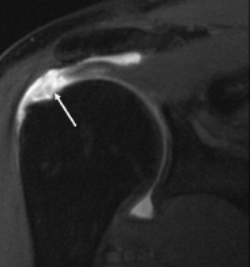In our previous blog post we described how few (16%) partial rotator cuff tears progress over time. Understanding the non progressive nature of the injury allows patients an opportunity to explore non surgical options including Physical Therapy. In this study they followed partial rotator cuff tears over time, but a more recent study followed patients with full thickness rotator cuff tears over a 5 year period.
Boorman and colleagues followed patients with chronic (> 3 months), full thickness rotator cuff tears (J Shoulder Elbow Surg. 2018). All patients participated in a comprehensive, Physical Therapy home exercise program. At 3 months, patients were categorized at successful (asymptomatic with Physical Therapy home exercises) or failure (continued pain and dysfunction). These patients were then referred for surgical consultation.
At 5 years, 84% of all patients were contacted to determine their current symptoms and functional level. 75% of patients treated non operatively remained asymptomatic with their strengthening program. Only 3 patients who were initially asymptomatic at 3 months required surgery over the 5 year follow up period. Importantly, the authors noted no difference in functional outcomes at 5 years between those patients treated surgically or with a home Physical Therapy exercise program. The authors concluded “non operative treatment is an effective and lasting option for many patients with a chronic, full thickness rotator cuff tear.” This study and our previous blog post challenge the belief that non operative interventions only delay eventual surgical interventions because very few tears regress and very few patients eventually undergo surgical repair.
To schedule your first appointment with the experts at MEND click here

